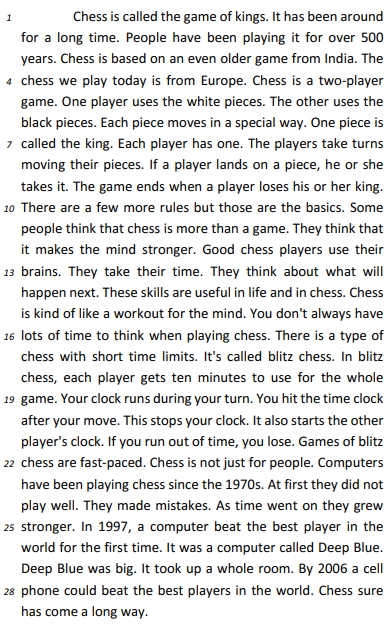Questões de Inglês - Pronomes | Pronouns para Concurso
Foram encontradas 490 questões
( ) The underlined word in “… it helps to know more about hot air balloons themselves.“ is a relative pronoun.
( ) The preposition in the following sentence “…keeping the balloon floating above the ground.” means that the balloon is floating over the ground.
( ) The words ‘actually’, ‘push’, and ‘major’ mean in Portuguese: ‘atualmente’, puxar’ and ‘maior’.
( ) The negative form of “A hot air balloon has three major parts: the basket, the burner, and the envelope.” is “A hot balloon doesn’t have three major parts: the basket, the burner, and the envelope.”
( ) The tense used in the question “Have you ever wondered what keeps a hot air balloon flying?”, is an example of Past Perfect.
Choose the alternative which presents the correct sequence, from top to bottom.

Internet: <www.nortechplus.com>.
Read the following text and answer question.
Introduction to global food loss and food waste
Food losses and food waste are quickly becoming a top global issue, because while there are millions of families with children starving, others are living in abundance, with many others carelessly throwing food away. Many of us have wasted food in one way or the other, but the real food losses and waste matter is ______ than just consumer food waste.
From farming fields and storage places, through transportation, processing, market places, down to
consumption places such as homes, schools, restaurants and workplaces, more than half of all food
produced globally go to waste. This is a tragedy!
In developing countries, it takes a lot of man-power to produce food. In more advanced countries, machines and technology are used, but the drain on energy, destruction of vegetative lands, the use of chemicals and ______ impact on the environment are phenomenal. Putting all that together, it is clear that a major problem has emerged and we are all in a position to help in one way or the other.
(Adapted from: https://goo.gl/ySEn3F. Access: 01/23/2018)
Read text I and answer the question that follow it.
Text I
The New Rules of Data Privacy
The data harvested from our personal devices, along with our trail of electronic transactions and data from other sources, now provides the foundation for some of the world’s largest companies. […] For the past two decades, the commercial use of personal data has grown in wild-west fashion. But now, because of consumer mistrust, government actions, and competition for customers, those days are quickly coming to an end.
For most of its existence, the data economy was structured around a “digital curtain” designed to obscure the industry’s practices from lawmakers and the public. Data was considered company property and a proprietary secret, even though the data originated from customers’ private behavior. That curtain has since been lifted and a convergence of consumer, government, and market forces are now giving users more control over the data they generate. Instead of serving as a resource that can be freely harvested, countries in every region of the world have begun to treat personal data as an asset owned by individuals and held in trust by firms.
This will be a far better organizing principle for the data economy. Giving individuals more control has the potential to curtail the sector’s worst excesses while generating a new wave of customer-driven innovation, as customers begin to express what sort of personalization and opportunity they want their data to enable. And while Adtech firms in particular will be hardest hit, any firm with substantial troves of customer data will have to make sweeping changes to its practices, particularly large firms such as financial institutions, healthcare firms, utilities, and major manufacturers and retailers.
Leading firms are already adapting to the new reality as it unfolds. The key to this transition — based upon our research on data and trust, and our experience working on this issue with a wide variety of firms— is for companies to reorganize their data operations around the new fundamental rules of consent, insight, and flow.
[…]
Federal lawmakers are moving to curtail the power of big tech. Meanwhile, in 2021 state legislatures proposed or passed at least 27 online privacy bills regulating data markets and protecting personal digital rights. Lawmakers from California to China are implementing legislation that mirrors Europe’s GDPR, while the EU itself has turned its attention to regulating the use of AI. Where once companies were always ahead of regulators, now they struggle to keep up with compliance requirements across multiple jurisdictions.
Adapted from: https://hbr.org/2022/02/the-new-rules-of-data-privacy
February 25, 2022 – Retrieved September 6, 2022